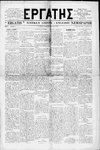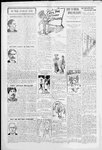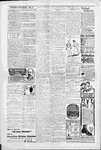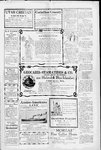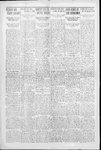| OCR Text |
Show SENT TO SIBERIA: MAKES Hilo ESCAPE aa IN THE PUBLIC EYE 'MAD RUN AFTER WILD TRAIN ON MALE ROAD STRING OF CAUGHT FREIGHT BY CARS ENGINE Ι8 AFTER LONG DOWN-GRADE RACE. CONGRESSMAN TO RETIRE SWISS PROFESSOR, FOR R G. « LIFE, SENTENCED MAKES ( BOLD Portland, perville, Ww DASH FOR LiBERTY. é 1 eigi { for But gove cove and when he mythical found the ‘eoon: “Don't m ΐ ‘ He has been in Gov, out to no boldly wo Cor jusins was bor the district rey nt He uated from Cornell college, Mt. V following year He was elected 1886, and was chosen by the house J. L. Brown in the impeachment j of the case attracted considerable ne ing attorney for his district and also Arrested Cum cor nd reduce the the ot 1 a rm on the Mr. Wister ot 3,458 is not by a locomotive most hazardous | 1 filled many | im} 1 for He select came οι has out as Iman of cry against “dirty streets, votes and the discouraged electior He did his | Re Still better GIVING. OLD SAWS RE-SAWED. A bird in the hand is worth two in the bush, but both are dirt cheap com pared with one on a hotel menu card Uneasy lies the head that wears a crow! es pec d in fly the crown is what he gets If you lead a horse to water and can’t make m drink, take a sip your self; he have good judgment. Beauty’s only skin deep, but that’s deep enough for the complexion spe ‘ i 2. t e give, in order of their pref i. Unwelecor Pa G Merely c. More τὶ useful 4. Good measure, s¢ deal. Very passionate givers will someti ‘ t the lis The majority, ] proceed only as long as they fi more blessed to give than to e, stopping, say, with No. 2 et beyond No, 3, b.—Puck. SONGS AND THEIR SINGERS. All's well that ends well except a best-selling” novel. Fine feathers make soft beds, Every rose has its thorn, and every dozen its florist bill Never put off till to-morrow what you can do to-day, unless some one did it yesterday.—Judge. Leading Up to His Support, “What's doing?” asked one reporter addressing another who had just emerged from the state senate chamber Senator Jayson is speaking.” “Jayson? He was speaking when I left, an hour ago.” speaking right “Yes; he’s been along, ever since.” “Have you been here since he} started?” “Yes.” Geneva.—An exciting and remar } lated by M. Maurice Gehri, a Swiss | professor who unexpectedly returned to the home of his parents at M: in the canton of Vana, a few days ago after a series of thr z experi nces M. Gehri was born at Morges on April 11, 1885, and after a brilliant school and university career he de cided to become a schoolmaster and accepted a post as professor of French at the Gymnase de Gitomir, in the government of Volhynia. He took up his duties in the spring of 1905, and | bega to study the political problems of Russia with enthusiasm. The sympathy he felt with those who were trying their utmost to bring about re| forms of the laws and to alleviate the | conditions under which the vast majority of the people lived soon at tracted the attention of the authorities to the young Swiss master, He was in sympathy with the efforts of the reformers, and as the son of a free | country, in which it is no crime to speak openly, he did not hesitate to express his opinions His clearly de. fined views roused the suspicions of the police, He was closely watched | and on August 28, 1906 (old style), he was arrested as a revolutic ; Political offenders in Russia have little chance of obtaining a hearing— much less of obtaining justice—and on April 4, 1907, after a trial which was 'a mere mockery, he was sentenced to | transportation for life. On August | he set out for Siberia with a band of | other prisoners The prisoners were | carried by train as far as Krasnoy| arsk, in the basin of the Yenisee, | where they detrained in order to com | plete the journey by road onfoot. Dayafter day they tramped on, weary | and footsore, but as they advancedfur- “What's he speaking about?” “T don't know. He hasn't said, so far?”’—Chicago Record-Herald. VERY PERSONAL. At 1 of the rrunk hansom, do yer?—Comic Cuts. Mobility. Mrs. Vick-Senn's eyes flashed. “Johnny doesn’t get that weak chin er his from my side of the house!” she exclaimed. “No, my dear,” meekly responded her husband. “Johnny has my chin, but he inherits his mother’s tireless capacity for keeping it in motion.”— Chicago Tribune. ALONE AND FORSAKEN. Conflicting Emotions. “Did you have a good time at your musicale?” “No,” answered Mr. Cumrox; “every time the band played anything I enjoyed I got worried for fear it wasn't classsical enough to be the money's worth.”—Washington Star. A PRETTY FIX. Johnny Elephant—I wonder why nobody wants to skate near me! I'm just as sociable as anyone. No Credit. “That billionaire seems willing to do something for humanity.” stituency. It might be added, too, that his better half is Scotch, being the daughter of Sir Charles “Yes,” answered Mr. Dustin Stax. “But he is always true to his business Tennant. He is a clear-headed, clever, shrewd lawyer and a hard worker. He has been in public lifé since 1886 as member for East Fife, and while he has been playing one of the most important roles in the drama of national politics, he has been carrying on an enormous legal practice at the same time. It was Mr. Asquith who first came out in fa vor of restoring self-government to the conquered Boer republics and ex pressed the hope that this step might result in a confederation of South Af rica, a practically independent country administering its own affairs as Cana da does without any interference on tue part of the imperial government He has succeeded in part, and when he is premier it is possible that the res of his program may be carried out, and Boer and Briton left to settle thei: own disputes. He is now 56 years of age, a comparative juvenile as thing: go in Britain, where a man is mot recognized as a statesman until he has principles. He took good care to make humanity pay him in advance.” —Washington Star. Hers by Purchase. “The woman who married that old rich fellow has simply sold her youth and loveliness.” “Well, if you could see her account at the beauty doctor's, I bet you'd find she had bought ‘em.” Lord Nocash—People say you married me for mytitle. Lady Nocash (nee Gotrox)—Well, they can't accuse me of having mar- A Sure Proof. “Does he move in high financial circles?” ried you for most exciusive indictment club in New York."—Baltimore American. Journal. money.—Chicago k, just as the last car Flyer on the Grand nd for Montreal, had ὴ Ἆ \ The Gain Was Tantalizingly Slow. passed Copperville station I a_ wild train of 20 cars loaded with pulpwood and without a locomotive, which had broken loose on a siding two miles away, ran on to the main line. It missed only by a few yards the rear car of the passenger train, bound north, and gathering speed every minute plunged along toward Portland At Berlin, five miles away, a big mogul engine with steam up happened to be on a siding. The operator at Copperville wired: “Look out; runawayfreight coming.” The last click of the message had hardly been received when the run| away, going at a mile and a half a | minute, rushed past the Berlin station. A \y ay The Dash for Liberty, |eab of the mogul. They knew the train was a runaway before the telegraph operator could tell them. The big engine snorted and trembled as the throttle was pulled wide open and she fairly rose from the rails as she struck the main strack. For ten miles south of Berlin it is all down grade. Then there is a gentle three-mile uphill stretch until Shelbourne, at the top of the rise is reached, where the steep down-grade begins again The only hope of the pursuers was to catch the freight before it reached the heights at Shelbourne Fast as the runaway went, the big locomotive, impelled by steam as well as gravity, went faster, but the gain was tantalizingly slow. Several times the runaway was sighted through the darkness on straight stretches of track, but when the wild freight cars reached the foot of the three-mile upgrade it still had half a mile lead. Its tremendous momentum scarcely seemed to lessen at first, but the mogul pushed doggedly uphill. As the freight’s speed began to lessen the mogul gained more rapidly. When the pilot was 100 yards from the last ear of the freight the fireman crawled out in front ready to make the coupling. Fron 100 yards the freight’s lead dwindled to 50, then to ten, and at last, when the runaway was starting downhill again, the fireman hitched the engine on and signaled for the engineer to put the air brakes on his wheels. ther and further from civilization the guards, sullen and relentless as they were, became less careful in their supervision and less strict. Doubtless they thought that escape was impossible—and indeed the majority of the prisoners, despondent and in despair, bad no heart to make an attempt. But while most of the others were resigned to their fate, M. Gehri Was keenly alive to everything that was taking place. He sawthat the laxity of the guards made an attempt to escape possible and he resolved to watch for and to seize the first favorable opportunity. Success meant life and liberty, instead of a living tomb; failure would not make his position much worse. And if he happened to be killed while making the attempt— well, his troubles would be over. The opportunity came on September 17, when they were about half way between Krasnoyarsk and their destination, the penal settlement, and M. | Gehri and two others, to whom he had | confided his intention, seized it with | MAY BE BRITISH PREMIER your it | The engineer and fireman were in the Foxy Humility. “Why don’t you go to work?” “Work!” rejoined Meandering Mike. “Look at de thousands of poor fellows that is lookin’ fur work an’ feelin’ miserable widout it. Now work ain't necessary to me, an’ I ain't goin’ to butt in an’ reach fur it mereiy fur de sake of havin’ something to brag about.”— Washington Star. Right Hon. Herbert Henry Asquith, who is slated to sueceed Sir Henry Campbell-Bannerman as premier of Britain, is one of the very few mem bers of the present cab/aet who are not Scotch He is a near approach to it, however, for he is a Yorkshireman and represents a Scotch con ( rded νὴ Ν ΣΝ. Habit. call yer t ἊΝ “It is curious how habits fix themselves upon us,” said Silas Hayrick’s nephew, who was studying for the ministry. Silas “Yep, I know it,” replied “You take Lizzie’s husband, fer instance. Sence they've moved up to the city where they have all these latest conveniences he takes a bath regular every week, whether he needs it or not.”—Chicago Reord-Herald. lord Chumpy (dressed for the opera)—Here, boy, call me a fourwheeler, will you? The Boy—Well, yer don’t think I'd € ‘ Ἂ Musical Pirate—'Ow would you like to spoon with me, miss, only a penny. PORT ARTHUR RECALLED The passing of the death sentence upon Gen. Stoessel is a harsh ending to the career of this Russian commander, who three years ago was acclaimed around the world as the “hero of Port Arthur.” The general, who was decorated by Emperor William of Germany and honored by the Russian army for his defense of the Port Arthur fortress, has now been tried and found wanting in courage and capability by his own people. Even Stoessel’s former enemies, the Japanese, came forward to say that he does not deserve this treatment at hands of his country, and Stoessel himself argued before the court-martial that he had justification for his act. In his last words before the court Gen. Stoessel, broken in health and fortune, accepted full responsibility for the surrender of Port Arthur and pleaded for the death sentence if the court should decide that a crime had been committed. The basis of the indictments upon which Stoessel, Gen. Fock, who com manded the Fourth East Siberian Division of Port Arthur, and Maj.-Gen. Reiss chief of staff to Gen. Stoessel, were tried for their lives was a secret report made by Lieut.Gen. Smirnoff on the defense of Port Arthur. Smirnoff was acting commandant of the fortress, Stoessel being commander of the Kwang: tung peninsula. Smirnoff categorically accused Stoessel of cowardice and in capacity, and finally of the deliberate and treasonable hastening of the sur render to save his own life, and in defiance of the decisions of two successive councils of war. The report was extremely biased. Gen, Smirnoff declared that the fortress, which was surrendered to the Japanese January 1, 1905, could have been held for six weeks longer In opposition to the statements made by Japanese officers who were the first to enter the fortress, Capt. Tsunoda, who, on behalf of Gen. Nogi, con ducted the negotiations for the surrender of the fortress, came out last sum mer with an open letter in defense of Stoessel. The Japanese captain painted a pitiable picture of the conditions prevailing at Port Arthur. Pe time e who live in glass houses Ww make sre if they raised hot hou rrapes instead of trouble Evil to him who evil thinketh, and that’s generally “The Virginiar politics. chase | ble story of escape from Siberia is 1 than he expected He expected 500 votes and he did somewhat better, so he expresses himself dee-lighted His friends were mostly Inde pendent in the sense that they could not be depended upon, otherwise he might have come within hailing distance of the victor. Wister is not the first novelist to make a “hash” of the political game. Booth Tarkington went to the Indianalegislature to make a fight against the cigarette bill, but failed, and he never got Nowhe and that other Hoosier author, George Ade, are helping along back Ade is to the long, thin boom of the long, thin Mr Fairbanks in Indiana, Another unsuccess go to the national convention as a Fairbanks delegate. ful politician, though a successful novelist, is Winston Churchill, our own Winston, not the much-advertised Englishman of the same name who is making a muddle of English politics, The American Winston ran for governor of New Hampshire on the reform ticket, but failed ingloriously. So Owen Wister fails in good company. Mr. Wister is a lawyer by profession, but like Anthony Hope his briefs are few and far between. He finds writing novels more entertaining and more lucrative. To gather material fof his stories he spends several months of each year in the country of the long-horned steer and the bucking broncho. His descriptions of ranch life and cowboy doings are graphic, for he has studied them for 20 years. He is said to be more at home on the ranch than in his native city, but he was equally as much at home in Paris, where he spent several years studying music after his graduation from Harvard. He has never got over his love for the gay capital, and to this day he regularly reads the Paris newspapers. 2 He has written several very successful books besides “The Virginian,’ the one that brought him before public attention being “The Dragon of Wantley.” He has also written a musical burlesque and several songs, be sides much prose and verse for the magazines. He is 48 years of age. weached three score and ten. an 85-mile-an-hour i dirty water, dirty air and dirty police but pponent, a common, ordinary, organization pubiear t one Seventh ward of his native Philadelphia, and 646 τ a Living Tomb. Pe eandidate I | bald at the Po left } announced po whirl be aded caught author of iking 1 « were ommittee on fore nd “3 in the trea tment attracting any particular attention Ow as co string 1 He Preferred Death to a AUTHOR LOSES IN POLITICS beer Officials 2 ym the j I'm a gone ‘coon has Russian awa cars ¢ Ν guerrilla cated and has spent all his life in n in Cedar county in 1859, grad n 1881, and admitted to the bar of the lowa state le ature f the prosecutors of State Audit s before the sen His conduct nd in 1888 he was elected prosecut ‘ lential elector sitions, notably that of chs chairman of the Birdsall has served three terms by Révolutionist—Tells Story of How iator Allison, and de who maintained an alliar hine Cousins failed to he found that the han the machine he w elf he said, like Dave ¢ t | h the was r turr ot: 1 Bi s { ‘ [iG Word Pe {τι a ht ind Μι near “You bet he does. He belongs to the both thands. While the guards were| drinking the three men crept out into | the darkness, determined to make a | bold dash for liberty, although they| had verylittle, if any, idea of the di- rection they should take. And in order to make pursuit difficult they separated almost at once. After many adventures, M. Gehri reached Vladivostok, and finally Japan, whence he telegraphed for money to pay his passage home to Switzerland. He set sail on November 16, on board the Messageries Maritimes liner Tonkin, and arrived home a few days ago safe and sound, and not much upset by the terrible experiences he had had. His -return was quite unexpected and when he reached home his parents were wondering when, if ever, they would see him again Real Fortitude. | I never knew any man in mylife who | would not bear another's misfortunes | perfectly like a Christian.—Alexander | Pope. | One hundred yards farther along the train was stopped, and a wreck and maybe a collision had been averted. Deer in Race with Train. Danville, Pa. — The engineer and fireman of a west-bound passenger train on the Pennsylvania railroad were treated to the extraordinary sight of a deer, frightened by the sudden approach of the train around 8 curve, springing directly between the rails and keeping ahead of the locomotive for about 1,000 yards. Then with the train almost upon it, it cleared the engine by a narrow margin and in full view of the passengers plunged into the river, filled with floating ice, and swam to an island in the middle of the stream. The deer, a “spike” buck, is undoubtedly the same one that has been seen periodically since fall in this vicinity and that about a month ago made its way to within 25 feet of the farmhouse of J. C. Carr and calmly peered in at a window. Will Develop Coai Lands. About 8,000 acres of coal lands in Monterey county, California, about 200 miles from San Francisco, are about to be developed in an extensive manner. Most of the coal of this section is lignitic in character, but this tract is said to contain a vein of se-ni-bituminous fuel. |

